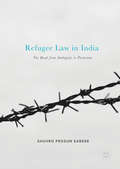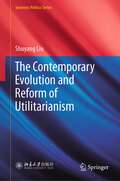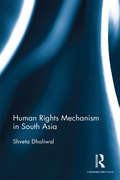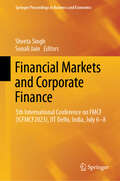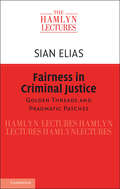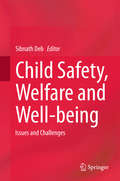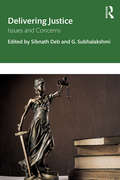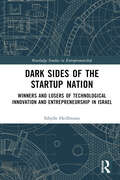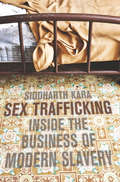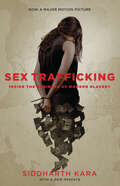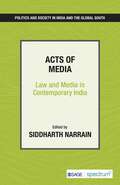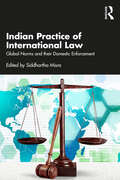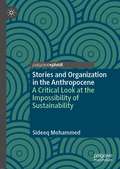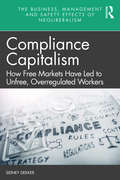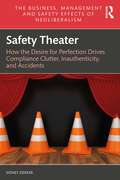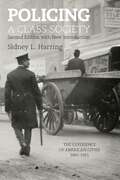- Table View
- List View
Refugee Law in India
by Shuvro Prosun SarkerThis book considers refugee protection mandates and addresses how legal scholarship can articulate a comprehensive and humane response to the contemporary refugee problem. Analyzing philosophical discourses and India's policies and practices on refugee protection, including judgments of Indian Courts in refugee related cases, it examines how organizational efforts can make these policies and practices equal for every refugee in India. It also surveys prevailing discriminative protection standards and entitlements developed through Conventions, Declaration and Directives, and compares and contrasts national refugee legislations in South Africa, Brazil and Canada. A key read for scholars and practitioners interested in the legal and policy implications of refugee protection, this text identifies various practices of nation-States from across the North/South divide and provides key insights into the evolving nature of protection agendas.
The Contemporary Evolution and Reform of Utilitarianism (Interests Politics Series)
by Shuyang LiuThis book is a monograph on contemporary utilitarianism, focusing on its evolving path and logic. It describes the evolution of utilitarianism from the classical model to the contemporary model and then summarizes the characteristics of contemporary utilitarianism, revealing its advantages and disadvantages. This book points out that the best characteristic of contemporary utilitarianism is to give up traditional view of individualism and take balanced attitude to the relationship between individual and community. The change makes the goal of contemporary utilitarianism from the pursuit of maximizing the sum of individual utilities to optimal social utility. Therefore, the contemporary utilitarianism gradually evolves a public philosophy with multiple interests structure, which provides a new way to solve the contradiction between personal interest and public interest.Utilitarianism is still an important political philosophy in western society, but its existing defects actually make it difficult to have a transformative impact on western institutional structure and system. The target audience of this book are students and researchers majoring in politics and ethics.
Human Rights Mechanism in South Asia
by Shveta DhaliwalShveta Dhaliwal teaches at the Rajiv Gandhi National University of Law, Punjab, Patiala, India. Her areas of specialisation are geopolitics, regional human rights systems, comparative political thought and international relations. She has published more than 40 research papers and presented over 150 papers in international and national conferences. She has an authored and three edited books to her credit. She is member of the Indian Political Science Association and the Indian Society of International Law and South Asian Foundation.
Financial Markets and Corporate Finance: 5th International Conference on FMCF (ICFMCF2023), IIT Delhi, India, July 6-8 (Springer Proceedings in Business and Economics)
by Shveta Singh Sonali JainThis book presents a selection of the best papers from the 5th International Conference on Financial Markets and Corporate Finance (ICFMCF2023), held in the Department of Management Studies, IIT Delhi, in July 2023. In today's dynamic and swiftly changing financial environment, marked by heightened volatility and complexity, ensuring the financial sector's resilience is paramount. The contents of this book address this gap by offering state-of-the-art research in the fields of financial institutions, financial markets, and corporate finance. The book specifically explores dynamic topics such as risk management in banks, the growth of fintech, cryptocurrencies, the proliferating usage of derivative instruments, CSR policies, and the effect of corporate governance and earnings management on firm performance, with a special emphasis on emerging economies. The studies utilize advanced and innovative qualitative and quantitative techniques to offer valuable insights into finance. The studies included in this book deliberate on theoretical work, empirical findings, and policy implications related to financial markets and corporate finance. Given the scope, the range of papers in this collection benefits academics, practitioners, industry experts, and policymakers seeking economic insights to address various challenges.
Vanishing Borders of Urban Local Finance: Global Developments with Illustrations from Indian Federation
by Shyam Nath Yeti Nisha MadhooThis book examines the emerging trends in vanishing borders of urban local government finance due to uncertain local tax and expenditure regimes. It analyzes the global developments with illustrations from state budgetary operations of the Indian federation. This trend has gained momentum due to concentration of population in cities and big towns as a consequence of globalization, leading to enhanced environmental vulnerability due to climate change. Expanding expenditure needs have not been corresponded by revenue regimes and transfers. Moreover, involving corporate sector in local area preference initiatives through mandatory corporate social responsibility (CSR) is an interesting development. It is expected to work as a local fiscal additionality to supplement locally provided civic and infrastructure services. This additionality may also evolve into public private partnerships at the local level. Such development however has the potential of displacing local government operations. The focus of the book hinges around critically examining setbacks to fiscal decentralization and challenges in improving the status of urban local finances to enhance fiscal autonomy of these governments, particularly in Indian scenario. The book also explores the possibility of an expanded role of local fiscal policy in the context of globalization and climate change, besides addressing the conventional responsibilities with respect to quality of civic services.
Intellectual Property and the Common Law
by Shyamkrishna BalganeshIn this volume, leading scholars of intellectual property and information policy examine what the common law - a method of reasoning, an approach to rule making, and a body of substantive law - can contribute to discussions about the scope, structure and function of intellectual property. The book presents an array of methodologies, substantive areas and normative positions, tying these concepts together by looking to the common law for guidance. Drawing on interdisciplinary ideas and principles that are embedded within the working of common law, it shows that the answers to many of modern intellectual property law's most puzzling questions may be found in the wisdom, versatility and adaptability of the common law. The book argues that despite the degree of interdisciplinary specialization in the field, intellectual property is fundamentally a creation of the law; therefore, the basic building blocks of the law can shed important light on what intellectual property can and should (and was perhaps meant to) be.
Fairness in Criminal Justice: Golden Threads and Pragmatic Patches (The Hamlyn Lectures)
by Sian EliasBritish criminal justice is a principal legacy of Empire in the common law world. It attempts fairness between prosecutors and accused in an accusatory system for establishing criminal responsibility supervised by a judge who is conspicuously detached from the fray. Fundamental features, today recognised as human rights, include the presumption of innocence and onus of proof, the privilege against self-incrimination, and the right to legal advice and representation. In these lectures, Dame Sian Elias examines modern challenges to this conception of criminal justice prompted by anxiety about crime and the costs and delays in proof of guilt. They include enlarged prosecutorial discretion in charging, incentivisation of early guilty pleas, adoption of reverse onuses of proof, application to criminal proceedings of principles of modern civil case management, and measures to bring the victim into the criminal justice system. The lectures question whether this repositioning risks the integrity of the system.
Extradition and Political Crimes: The Use of the Political Offence Exception in Europe (Transnational Criminal Justice)
by Sibel TopThis book examines the evolution and current application of the political offence exception clause to extradition in Europe.The long-standing academic exploration of terrorism has recently given way to renewed interest in the political offence exception to extradition, prompted by recent events that signal a democratic downturn globally. Despite the significant curtailment – and, in some cases, the complete abolition – of the political offence exception to extradition in Europe, certain European states continue to quietly implement this exception to deny extradition requests. This work studies the development of the political offence exception in Europe by narrowing its focus from an international perspective to the European context, specifically examining the Council of Europe and the European Union, before zeroing in on the Catalan independence crisis, which offers a particularly valuable case for analysing the application of the political offence exception in the European context.By providing a detailed examination of the evolving protections for political offenders within European legal frameworks, the text updates the long overdue academic knowledge on the matter. It is therefore an essential resource for anyone interested in European criminal law and extradition, in particular. It will also be of interest to researchers, academics, and policy-makers working in the areas of criminal law, human rights law, legal theory, criminology, and political science.
Child Safety, Welfare and Well-being: Issues and Challenges
by Sibnath DebThis volume presents the unique features of child abuse and neglect and discusses proposed as well as experimented protective measures to create awareness about child rights and their implementation. Divided into four sections, the volume discusses (a) the nature and prevalence of child abuse and neglect, risk factors and impact; (b) issues pertaining to child rights with regard to nutrition, health and education; (c) rights of children with disabilities, HIV/AIDS, and in circumstances like disaster and adoption; and (d) field-based experiences of researchers in protecting child rights and preventing child abuse. The most important contribution of this volume is in providing an analysis of the current legal scenario of child protection, emphasizing the rights of different sections of vulnerable children. Professionals and academics specializing in this area from different academic backgrounds and regions have contributed chapters to this volume, creating a global and multidisciplinary forum for discussion. This volume is important for a wide range of professionals and researchers from the social sciences, law, medicine, and behavioral sciences. It is also beneficial for policy makers and law enforcement agencies working with children.
Delivering Justice: Issues and Concerns
by Sibnath Deb; G. SubhalakshmiThis book critically analyzes emerging issues and challenges in delivering timely justice to common people. It brings a wide range of contemporary and relevant issues relating to the gross violation of human rights and presents situation-based evidence from, and first-hand experiences of, behavioral, social and legal professionals. It deals with themes such as holding administrations accountable and securing justice, challenges for the judiciary in the early disposal of cases, challenges to the forensic community, green federalism and environmental justice, current threats to human rights, ethics in the criminal justice system and honor killing from socio-cultural perspectives. Topical and comprehensive, this book will be an excellent read for scholars and researchers of political studies, legal studies, human rights, psychology, behavioural studies, political sociology, sociology, development studies, governance and public policy, environmental studies and South Asian studies. It will also interest policymakers, nongovernmental organizations, activists and professionals in the field.
Dark Sides of the Startup Nation: Winners and Losers of Technological Innovation and Entrepreneurship in Israel (Routledge Studies in Entrepreneurship)
by Sibylle HeilbrunnIsraeli national neoliberalism has promoted innovation policies leading to an ostensible paradox: At the center is a startup nation with a vibrant and successful high-tech entrepreneurial ecosystem, accumulating resources and enabling constant growth. At the geographical and social periphery, there has emerged a parallel society with often-marginalized groups not able to keep up. In one of the most unequal countries with a high rate of poverty, entrepreneurial heroes are celebrated at the center, promoting a myth that all could be self-made successes. At the periphery, entrepreneurs are struggling to survive, often pushed into precarious working and living conditions. Applying critical theory discourse, this book illustrates how neoliberalism and entrepreneurship are intertwined and how the startup nation has evolved in Israel. It explores how national neoliberal state policies have targeted technological innovation as a tool to obtain a competitive advantage in the international arena rather than aiming at increasing economic achievements and well-being for all. It will demonstrate that the Israeli entrepreneurship scene exemplifies the existence of parallel entrepreneurial societal spaces, analyze the positionality of entrepreneurs belonging to a variety of groups that characterize Israeli society, and uncover structural disadvantages and related levels of precarity as well as existing links between entrepreneurial advantages and disadvantages, mobility and varying degrees of social marginality. Dark Sides of the Startup Nation sheds light onto the problematic and sometimes contradictory myth that entrepreneurship is meritocratic and that neoliberal capitalism provides everyone with equal opportunities to succeed. The book will be of interest to researchers, academics, policy makers and students in the fields of entrepreneurship and small business management, responsibility and business ethics, and technology and innovation.
Sex Trafficking: Inside the Business of Modern Slavery
by Siddharth KaraEvery year, hundreds of thousands of women and children are abducted, deceived, seduced, or sold into forced prostitution, coerced to service hundreds if not thousands of men before being discarded. These trafficked sex slaves form the backbone of one of the world's most profitable illicit enterprises and generate huge profits for their exploiters, for unlike narcotics, which must be grown, harvested, refined, and packaged, sex slaves require no such "processing," and can be repeatedly "consumed."Kara first encountered the horrors of slavery in a Bosnian refugee camp in 1995. Subsequently, in the first journey of its kind, he traveled across four continents to investigate these crimes and take stock of their devastating human toll. Kara made several trips to India, Nepal, Burma, Thailand, Laos, Vietnam, the United Kingdom, Italy, the Netherlands, Denmark, Albania, Moldova, Mexico, and the United States. He witnessed firsthand the sale of human beings into slavery, interviewed over four hundred slaves, and confronted some of those who trafficked and exploited them.In this book, Kara provides a riveting account of his journey into this unconscionable industry, sharing the moving stories of its victims and revealing the shocking conditions of their exploitation. He draws on his background in finance, economics, and law to provide the first ever business analysis of contemporary slavery worldwide, focusing on its most profitable and barbaric form: sex trafficking. Kara describes the local factors and global economic forces that gave rise to this and other forms of modern slavery over the past two decades and quantifies, for the first time, the size, growth, and profitability of each industry. Finally, he identifies the sectors of the sex trafficking industry that would be hardest hit by specifically designed interventions and recommends the specific legal, tactical, and policy measures that would target these vulnerable sectors and help to abolish this form of slavery, once and for all.The author will donate a portion of the proceeds of this book to the anti-slavery organization, Free the Slaves.
Sex Trafficking: Inside the Business of Modern Slavery
by Siddharth KaraSince the publication of Sex Trafficking in 2007, Siddharth Kara has continued to travel across countries and continents, documenting the local factors and economic forces that support sexual slavery worldwide. His riveting encounters with victims and traffickers informed his screenplay for Trafficked (2016), now a major motion picture. The film features familiar figures from Sex Trafficking and the shocking conditions of their exploitation. It also includes cases Kara has uncovered since his book debuted.This new paperback edition of Sex Trafficking includes a preface by Kara in which he discusses his findings and updates the statistics relating to his business and economic analysis of contemporary slavery. After fifteen years, Kara has recorded nearly 900 cases of sex trafficking in forty-one countries and has helped advise on numerous legal, tactical, and policy efforts for abolishing modern-day slavery across the globe. Sex Trafficking continues to lead as a resource for those hoping to expose this hidden evil and eradicate its practice once and for all.
Acts of Media: Law and Media in Contemporary India
by Siddharth NarrainActs of Media seeks to consolidate a field of multidisciplinary work around media technologies that intersects with legal scholarship. This volume brings together contributions from leading academics, lawyers, researchers and policy experts about contemporary India and Sri Lanka. The approaches to law and media taken in this volume challenge us to think outside of traditional disciplinary descriptions. Rather than approaching the law as being outside of, and constantly catching up with the media, the contributors of this book view law and media as being deeply intertwined. The chapters in this volume address the relationship between law and media through different entry points---disputes over media and information systems shaping law, theories of law that incorporate media forms, and law and media co-producing trials. The multidisciplinary nature of this book has facilitated a rich and productive conversation among legal scholars, researchers and lawyers from disciplines such as constitutional law, law and technology, media and cinema studies, legal anthropology and political science.
Indian Practice of International Law: Global Norms and their Domestic Enforcement
by Siddhartha MisraThis book engages with different aspects of India’s practice of international law. It covers a diverse range of areas such as human rights, humanitarian law, migration, diplomacy, extradition, environment, trade, investment, taxation, cyberspace, data protection, maritime, and intellectual property to showcase India’s strong commitment to respect and observe international law.The volume discusses various themes which include: Legal and constitutional framework; Air, space, and atomic energy; Environment; Sea and maritime law; Trade, investment, and taxation; Conflict of laws; IT and data protection; Human rights and humanitarian law; Issues of refugees and internally displaced persons; Extradition and diplomatic immunities; Intellectual property; International obligations. The essays in this book also establish the linkage between observance of international law and bilateral and multilateral relations between different countries.Comprehensive and analytical, this book will be useful for scholars and researchers of law, international law, human rights, and foreign policy. It will also be an invaluable companion for professionals in law firms and think tanks, bureaucrats, and diplomats.
Stories and Organization in the Anthropocene: A Critical Look at the Impossibility of Sustainability
by Sideeq MohammedThis book is about the stories being told in the Anthropocene. Stories of irreparable damage being done to the global ecosystem, of sustainable growth, of dystopian collapse, of continued interspecies flourishing, of Gaia, and of accelerating capitalism’s dynamics in order to discover its outside. Stories of change. Stories of hope. Against them all, this book seeks to braid together a particular thread of storying in order to speak to the emergence of the mall at the end of the world; a space where a new politics of “spectral capitalism” is played out. In doing so, we reflect that there never was any outside to Capital, that it can live forever, its performances and spectacles being preserved despite global ecological collapse. This book seeks to understand the nascence of the mall at the end of the world and the new people, thoughts, and dreams that come with it.
A Moral Military, Revised and Expanded Edition
by Sidney AxinnShould a good soldier ever disobey a direct military order? Are there restrictions on how we fight a war? What is meant by 'military honor', and does it really affect the contemporary soldier? Is human dignity possible under battlefield conditions? Sidney Axinn considers these basic ethical questions within the context of the laws of warfare and answers 'yes' to each of these questions. In this study of the conduct of war, he examines actions that are honorable or dishonorable and provides the first full-length treatment of the military conventions from a philosophical point of view. Axinn gives a philosophical analysis of the 'Laws of Warfare' as found in the Hague and Geneva Conventions, which have been agreed to by almost every nation in the world. The aims of his study are to establish a basic twentieth-century framework for moral military action and to assist military personnel in analyzing their won professional ethic.Stating that moral reasoning is required by people in military uniform in a wide variety of situations, the author examines the question of the limits of military obedience. Axinn argues for the seriousness of the concept of military honor but limits honorable military activity by a strict interpretation of the notion of war crime. Major chapters deal with military honor, prisoners of war, spying, war crimes, the dirty-hands theory of command, nuclear weapons, terrorism, and covert operations. This philosophical study of the line between honorable and dishonorable military action cautions that in compliance with the war conventions professional military personnel and knowledgeable civilians must not lose their moral nerve nor abandon honor to satisfy immoral political requests. Author note: Sidney Axinn is Professor of Philosophy at Temple University.
Compliance Capitalism: How Free Markets Have Led to Unfree, Overregulated Workers (The Business, Management and Safety Effects of Neoliberalism)
by Sidney DekkerIn this book, Sidney Dekker sets out to identify the market mechanisms that explain how less government paradoxically leads to greater compliance burdens. This book gives shape and substance to a suspicion that has become widespread among workers in almost every industry: we have to follow more rules than ever—and still, things can go spectacularly wrong. Much has been privatized and deregulated, giving us what is sometimes known as ‘new public management,’ driven by neoliberal, market-favoring policies. But, paradoxically, we typically have more rules today, not fewer. It’s not the government: it’s us. This book is the first of a three-part series on the effects of ‘neoliberalism,’ which promotes the role of the private sector in the economy. Compliance Capitalism examines what aspects of the compliance economy, what mechanisms of bureaucratization, are directly linked to us having given free markets a greater reign over our political economy. The book steps through them, picking up the evidence and levers for change along the way. Dekker’s work has always challenged readers to embrace more humane, empowering ways to think about work and its quality and safety. In Compliance Capitalism, Dekker extends his reach once again, writing for all managers, board members, organization leaders, consultants, practitioners, researchers, lecturers, students, and investigators curious to understand the genuine nature of organizational and safety performance.
Safety Theater: How the Desire for Perfection Drives Compliance Clutter, Inauthenticity, and Accidents (The Business, Management and Safety Effects of Neoliberalism)
by Sidney DekkerHow is it possible that the desire for a perfectly safe world with perfectly safe workplaces helps generate the opposite? Safety Theater shows how our desire for perfection drives compliance clutter, inauthentic relationships with work-as-done, and new kinds of accidents. Written by the leading global voice on safety innovation today, Safety Theater takes us back to the Enlightenment and its aspiration toward a perfectible world through rationality and science, and explains how, by separating severity from injury rates two centuries later, we now hit our targets but miss the point. This hopeful, forward-looking book is the final volume in a three-part series on the effects of "neoliberalism," which promotes the role of the private sector in the economy.Showcasing a more caring kind of capitalism—where free markets are free in a frame; where horizontal coordination replaces hierarchical control; where shareholders are not the only stakeholders; and where value and prosperity are assessed in terms other than merely economic ones—the book platforms much of what is now known as "safety differently," and also allows us to think differently about our capacity to manage complexity (including its possible drift toward failure) and see our fellow human beings as resources for solutions, not as problems to control. Safety Theater introduces the socio-economic success and value system that distinguish Rhineland economies from Anglo ones. It explains how complexity can never be governed through hierarchy and compliance, but necessarily requires trust and horizontal coordination; offers a vision of humanity richer than Anglo-style capitalism can offer; and examines how Rhineland thinking values tripartite consultation (between workers, employers, and government) in ways that can help stem the worst effects of free market policymaking on the compliance clutter and drift into failure, as detailed in the previous two volumes in this trilogy.Sidney Dekker’s work—from his debut Field Guide to Understanding Human Error in 2001 to his recent Random Noise—always challenges readers to embrace more humane, empowering ways to think about work and its quality and safety. In Safety Theater, Dekker extends his reach once again, writing for all managers, board members, organization leaders, consultants, practitioners, researchers, lecturers, students, and investigators curious to understand the genuine nature of organizational and safety performance.
"Expanding the Frontiers of Civil Rights": Michigan, 1948-1968 (Great Lakes Books Series)
by Sidney FineAlthough historians have devoted a great deal of attention to the development of federal government policy regarding civil rights in the quarter century following World War II, little attention has been paid to the equally important developments at the state level. Few states underwent a more dramatic transformation with regard to civil rights than Michigan did. In 1948, the Michigan Committee on Civil Rights characterized the state of civil rights in Michigan as presenting "an ugly picture." Twenty years later, Michigan was a leader among the states in civil rights legislation. "Expanding the Frontiers of Civil Rights" documents this important shift in state level policy and makes clear that civil rights in Michigan embraced not only blacks but women, the elderly, native Americans, migrant workers, and the physically handicapped.
The Metaphysics of Pragmatism
by Sidney HookConsidered by some the most controversial American philosopher of contemporary times, SIDNEY HOOK (1902-1989) was infamous for the wild swing in his political thought over the course of his career, starting out as a young Marxist before the Great Depression and ending up a vehement anti-Communist in his later years. The Metaphysics of Pragmatism-Hook's first work, originally published in 1927-is something of a malicious joke on the philosopher's part, one he readily acknowledges in his introduction, a bringing together of one discipline, that of metaphysics, with the one generally regarded as its polar opposite, that of pragmatism, for the purposes of rescuing the second. Though not a political work at all—except, possibly, one of academic politics—this is nevertheless a fascinating introduction to this notorious figure. In its expression of the author's "passionate moral interest in the creative power... of human thinking," it may, perhaps, begin to lend some understanding to the shifts in his own thinking that characterized his work.—Print ed.
Healing Lessons
by Sidney J WinawerDr. Sidney J. Winawer was one of the world's leading cancer experts. Yet when his wife Andrea was stricken with stomach cancer, not even his skills and dedication as a physician could reverse the grim prognosis. Together the couple explored complementary and alternative treatments. Healing Lessons is a testament to the strength of love and the story of a doctor's transformation--the new treatments he embraced and the lessons he learned on the opposite side of the doctor-patient relationship.
Policing a Class Society: The Experience of American Cities, 1865-1915
by Sidney L. HarringPolice are popularly understood as the “thin blue line” that “serves and protects” us from violence and crime in the pursuit of justice. In Policing a Class Society, Sidney L. Harring provides an essential corrective to the ideas that police have always been around, that they are a force for deterring crime, or that theyhave an interest in the pursuit of justice. Looking at the growth of the urban police force around the turn of the 20th century, Harring argues that the police protected the interestsof manufacturers, working almost as hired guns. Rather than fighting crime, the historical role of police was to control the leisure activity of the devloping working-class and maintainthe existing order of capitalist relationships.
Business-Coach trifft Philosophen: Ein Dialog
by Walter Schwertl Siegfried J. SchmidtSJ Schmidt als bekannter Geisteswissenschaftler und Walter Schwertl Praktiker im Bereich Business-Coaching nähern sich in Dialogform der Frage, wie ein Geisteswissenschaftler und ein Praktiker eine hinreichend gemeinsame Konzeption von Kommunikation erarbeiten können. Gerade zwischen hoch abstrakten Theorien selbstreferentieller Systeme und dem, was als systemische Praxis bezeichnet wird, erscheint die Kluft unüberwindbar. Die Autoren spannen einen Bogen zwischen philosophischen Diskursen und Fragen alltäglichen Handelns. Der Hinweis auf die Vorgeschichte des Buches lässt erahnen, dass die Protagonisten Neugierde auf die Argumente des Anderen, Vertrauen und respektvollen Kommunikationsstil der Kluft erfolgreich entgegensetzen.
Race, Class, and Affirmative Action
by Sigal AlonNo issue in American higher education is more contentious than that of race-based affirmative action. In light of the ongoing debate around the topic and recent Supreme Court rulings, affirmative action policy may be facing further changes. As an alternative to race-based affirmative action, some analysts suggest affirmative action policies based on class. In Race, Class, and Affirmative Action, sociologist Sigal Alon studies the race-based affirmative action policies in the United States. and the class-based affirmative action policies in Israel. Alon evaluates how these different policies foster campus diversity and socioeconomic mobility by comparing the Israeli policy with a simulated model of race-based affirmative action and the U.S. policy with a simulated model of class-based affirmative action. Alon finds that affirmative action at elite institutions in both countries is a key vehicle of mobility for disenfranchised students, whether they are racial and ethnic minorities or socioeconomically disadvantaged. Affirmative action improves their academic success and graduation rates and leads to better labor market outcomes. The beneficiaries of affirmative action in both countries thrive at elite colleges and in selective fields of study. As Alon demonstrates, they would not be better off attending less selective colleges instead. Alon finds that Israel’s class-based affirmative action programs have provided much-needed entry slots at the elite universities to students from the geographic periphery, from high-poverty high schools, and from poor families. However, this approach has not generated as much ethnic diversity as a race-based policy would. By contrast, affirmative action policies in the United States have fostered racial and ethnic diversity at a level that cannot be matched with class-based policies. Yet, class-based policies would do a better job at boosting the socioeconomic diversity at these bastions of privilege. The findings from both countries suggest that neither race-based nor class-based models by themselves can generate broad diversity. According to Alon, the best route for promoting both racial and socioeconomic diversity is to embed the consideration of race within class-based affirmative action. Such a hybrid model would maximize the mobility benefits for both socioeconomically disadvantaged and minority students. Race, Class, and Affirmative Action moves past political talking points to offer an innovative, evidence-based perspective on the merits and feasibility of different designs of affirmative action.
